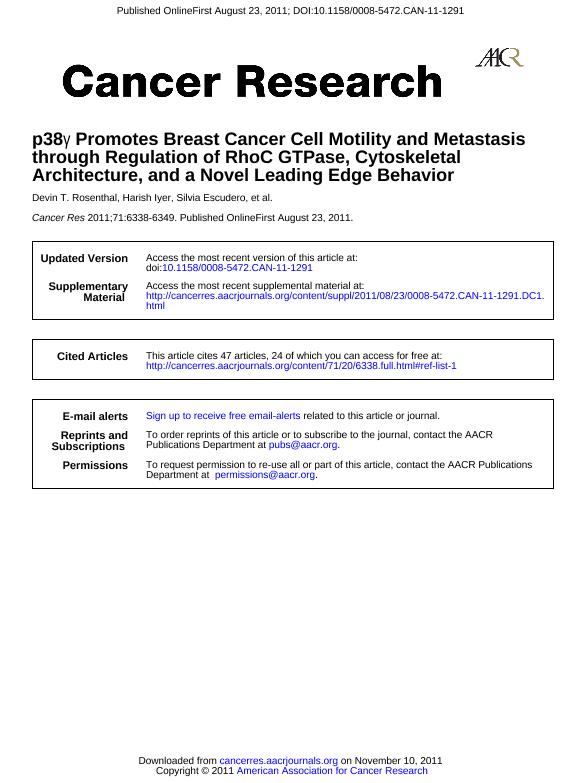Mostrar el registro sencillo del ítem
dc.contributor.author
Rosenthal, Devin T.
dc.contributor.author
Iyer, Harish
dc.contributor.author
Escudero, Silvia
dc.contributor.author
Bao, Liwei
dc.contributor.author
Wu, Zhifen
dc.contributor.author
Ventura, Alejandra

dc.contributor.author
Kleer, Celina G.
dc.contributor.author
Arruda, Ellen M.
dc.contributor.author
Garikipati, Krishna
dc.contributor.author
Merajver, Sofia D.
dc.date.available
2019-11-07T17:52:49Z
dc.date.issued
2011-10
dc.identifier.citation
Rosenthal, Devin T.; Iyer, Harish; Escudero, Silvia; Bao, Liwei; Wu, Zhifen; et al.; p38γ promotes breast cancer cell motility and metastasis through regulation of RhoC GTPase, cytoskeletal architecture, and a novel leading edge behavior; American Association for Cancer Research; Cancer Research; 71; 20; 10-2011; 6338-6349
dc.identifier.issn
0008-5472
dc.identifier.uri
http://hdl.handle.net/11336/88181
dc.description.abstract
Understanding the molecular alterations that confer cancer cells with motile, metastatic properties is needed to improve patient survival. Here, we report that p38γ motogen-activated protein kinase regulates breast cancer cell motility and metastasis, in part, by controlling expression of the metastasis-associated small GTPase RhoC. This p38γ-RhoC regulatory connection was mediated by a novel mechanism of modulating RhoC ubiquitination. This relationship persisted across multiple cell lines and in clinical breast cancer specimens. Using a computational mechanical model based on the finite element method, we showed that p38γ-mediated cytoskeletal changes are sufficient to control cell motility. This model predicted novel dynamics of leading edge actin protrusions, which were experimentally verified and established to be closely related to cell shape and cytoskeletal morphology. Clinical relevance was supported by evidence that elevated expression of p38γ is associated with lower overall survival of patients with breast cancer. Taken together, our results offer a detailed characterization of how p38γ contributes to breast cancer progression. Herein we present a new mechanics-based analysis of cell motility, and report on the discovery of a leading edge behavior in motile cells to accommodate modified cytoskeletal architecture. In summary, these findings not only identify a novel mechanism for regulating RhoC expression but also advance p38γ as a candidate therapeutic target.
dc.format
application/pdf
dc.language.iso
eng
dc.publisher
American Association for Cancer Research

dc.rights
info:eu-repo/semantics/openAccess
dc.rights.uri
https://creativecommons.org/licenses/by-nc-sa/2.5/ar/
dc.subject
MATHEMATICAL ONCOLOGY
dc.subject
CELL MOTILITY
dc.subject
METASTASIS
dc.subject
CYTOSKELETAL ARCHITECTURE
dc.subject.classification
Biofísica

dc.subject.classification
Ciencias Biológicas

dc.subject.classification
CIENCIAS NATURALES Y EXACTAS

dc.title
p38γ promotes breast cancer cell motility and metastasis through regulation of RhoC GTPase, cytoskeletal architecture, and a novel leading edge behavior
dc.type
info:eu-repo/semantics/article
dc.type
info:ar-repo/semantics/artículo
dc.type
info:eu-repo/semantics/publishedVersion
dc.date.updated
2019-09-30T15:24:10Z
dc.journal.volume
71
dc.journal.number
20
dc.journal.pagination
6338-6349
dc.journal.pais
Estados Unidos

dc.journal.ciudad
Philadelphia
dc.description.fil
Fil: Rosenthal, Devin T.. University of Michigan; Estados Unidos
dc.description.fil
Fil: Iyer, Harish. University of Michigan; Estados Unidos
dc.description.fil
Fil: Escudero, Silvia. Harvard Medical School; Estados Unidos
dc.description.fil
Fil: Bao, Liwei. University of Michigan; Estados Unidos
dc.description.fil
Fil: Wu, Zhifen. University of Michigan; Estados Unidos
dc.description.fil
Fil: Ventura, Alejandra. Consejo Nacional de Investigaciones Científicas y Técnicas. Oficina de Coordinación Administrativa Ciudad Universitaria. Instituto de Fisiología, Biología Molecular y Neurociencias. Universidad de Buenos Aires. Facultad de Ciencias Exactas y Naturales. Instituto de Fisiología, Biología Molecular y Neurociencias; Argentina. Universidad de Buenos Aires. Facultad de Ciencias Exactas y Naturales. Departamento de Fisiología, Biología Molecular y Celular. Laboratorio de Fisiología y Biología Molecular; Argentina
dc.description.fil
Fil: Kleer, Celina G.. University of Michigan; Estados Unidos
dc.description.fil
Fil: Arruda, Ellen M.. University of Michigan; Estados Unidos
dc.description.fil
Fil: Garikipati, Krishna. University of Michigan; Estados Unidos
dc.description.fil
Fil: Merajver, Sofia D.. University of Michigan; Estados Unidos
dc.journal.title
Cancer Research

dc.relation.alternativeid
info:eu-repo/semantics/altIdentifier/doi/http://dx.doi.org/10.1158/0008-5472.CAN-11-1291
dc.relation.alternativeid
info:eu-repo/semantics/altIdentifier/url/https://cancerres.aacrjournals.org/content/71/20/6338
Archivos asociados
